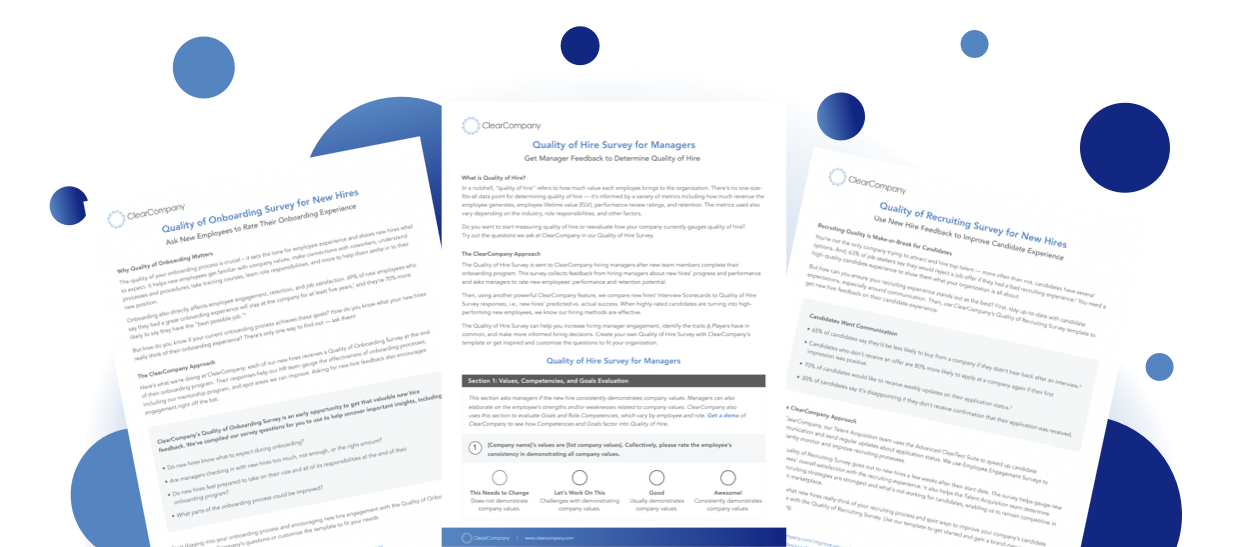By now, you’re used to dealing with uncertainty in the talent management landscape. Unfortunately, one thing that is certain is that some of your employees are feeling disconnected at work. Between the Great Resignation, the decline in engagement, and the recent phenomenon of ‘quiet quitting,’ it’s been a challenge not only to hire employees but to get them invested in their work.
Like many other HR teams, yours may also face the challenge of returning to an effective performance management process after modifying reviews or scrapping them altogether since 2020. Companies need to help employees make those connections — or risk high levels of disengagement and turnover. Your company also needs to define a process for managing employee performance. It’s essential for making important staffing and role development decisions, and it’s integral to company culture, reflecting its commitment to employees’ growth and success.
You can fight against this disconnect at your organization and facilitate helpful performance conversations with one-on-one meetings. According to SHRM, employees are three times more likely to be engaged if they have weekly manager check-ins. One-on-ones are the key to creating trust, increasing transparency, and building productive, high-performing teams.
Weekly #checkins mean employees are 3x more likely to be engaged — and that’s good for company culture, making work friends, and #professionaldevelopment:What is a 1:1 Meeting?
In the context of performance and engagement strategy, one-on-one meetings are regular check-ins between employees and their direct supervisors. During these meetings, employees can give status updates on their current projects, get help removing roadblocks, and discuss career development. Managers can check in on goal progress, provide employee feedback and praise, resolve issues, and look for coaching opportunities.
Employee check-ins are usually weekly but may take place more or less often depending on their needs. The important thing is to maintain a consistent schedule and keep meetings around 30 minutes or less. Best practices for managers also include setting a meeting agenda, taking notes, and asking team members for feedback about the manager’s performance and organizational changes.
"One-on-ones aren't just for talking about goals or banging out a task list together. They're meant to create a strong foundation for relationships with employees. To that end, these meetings should have a balance of tasks, goals, rapport, and feedback. It's essential to use this time to build a solid relationship with each of your employees, where you feel you can give constructive feedback that will be well-received."
- Adam Weber, chief people officer at Emplify, via SHRM
The Importance of Employee 1:1s
While one-on-ones are a dedicated time for managers and employees to talk about work, they’re also a chance to check in on a personal level if you want to boost engagement and create that ideal company culture. Use weekly check-ins purposefully in performance and engagement strategy to create a company culture in which employees feel:
- Interested in their work
- Connected to their colleagues
- Equipped with what they need to meet their goals
- Valued for their contributions and skills
- Invested in business success
- Motivated and supported in pursuing professional development opportunities
Let’s take a closer look at why one-on-one meetings are so important for employee performance and engagement.
1:1s Promote Employee Engagement
Gallup data shows that employees are four times more likely to be engaged if they had received “meaningful feedback” from managers in the past week. 86% of highly engaged companies are having regular one-on-ones. Gallup also reported that managers are responsible for 70% of the variance in employee engagement. In other words, where there’s regular weekly communication, there’s higher engagement — and whether engagement is high or low, you can look to managers to find out why.
1:1s Nurture Employee-Manager Relationships
Did you know that 55% of employees say annual reviews don’t improve their performance? That’s no surprise if managers are initiating performance conversations just once a year — they’re unfamiliar territory and neither the manager nor the employee is used to talking about performance. SHRM reports that annual reviews can actually increase employees’ fear of confrontation and lead to avoidance and even less communication. Clearly, that doesn’t help create trusting, positive work relationships.
On the other hand, when one-on-ones are a regular occurrence, communication comes much more naturally to both managers and employees. And, it’s what employees want — 96% say continuous feedback is a good thing. When performance discussions become commonplace, they can be collaborative instead of stressful. It builds trust — the foundation of a solid employee-manager relationship.
Managers should also take the time to ask employees about their well-being during one-on-one meetings: 84% of Gen Z and 79% of Millennial employees say they’re experiencing burnout. Showing employees you care about them on a personal level helps them feel comfortable asking for help and sharing their opinions and feedback, strengthening trust.
1:1s Help Employees Achieve Goals
When working toward a goal, employees often run into unforeseen obstacles. To get past them, they can seek advice and then change their approach or set a new goal. But 32% of employees say they wait more than three months to get feedback from their managers — and by then, they’re falling short of their goal, or the issue is long forgotten.
32% of employees have to wait over 3 months for manager feedback. Find out why they should be getting weekly feedback instead:When one-on-ones are part of your employee performance strategy, employees don’t have to schedule a special meeting or wait for their next review to get advice. Weekly check-ins are a standing opportunity to bring up any problems they’re having. Managers can help employees work through issues and if necessary, adjust their goals. Employees get more opportunities to learn and stay on track with goal progress.
“Candid conversations are founded in relationships and having those conversations regularly. You’re having that ongoing dialogue about the status of goals. And so perhaps you’re resetting and recalibrating your goals for that quarter or that month based on what might be happening around you. That’s okay.”
- Kelli Jordan, director of careers, skills, and performance at IBM, via HR Brew
1:1s Inspire Learning and Development
With a year’s worth of work to discuss, traditional performance reviews don’t exactly encourage discussions about how employees can grow in the future. Employees miss out on valuable guidance from their managers, who are also losing opportunities to develop their own coaching and leadership skills. Ineffective, unpopular annual reviews cause disengagement, leaving you with managers who give unhelpful feedback and unmotivated employees who are remaining stagnant.
One-on-one meetings can reverse this trend, helping managers become coaches and employees, more interested in being coached. Weekly check-ins allow employees to develop agility — the ability to quickly change course based on feedback — and can help them discover their strengths.
1:1s Create Transparency
At an administrative level, one-on-one meetings contribute to a thorough record of employee performance. This provides context for future performance and can help managers give the right kind of support. For example, if an employee is struggling to meet some of their goals, managers who meet with them weekly will know if poor performance is a fluke or the norm and can make an informed decision about how to address it.
Whether the manager decides to temporarily adjust the employee’s goals or put them on a performance improvement plan, one-on-one records back them up.
Collaborative, Continuous, Cloud-Based 1:1s
It’s far easier to maintain an archive of one-on-ones with cloud-based performance management software. Managers and employees can set one-on-one schedules, work together to create an agenda, and take private and shareable notes. The shared meeting archive enables more productive performance conversations and strengthens transparency and trust.
Create digital one-on-one records effortlessly and usher in a new era of manager check-ins with 1:1 Workspaces from ClearCompany, available now in our Performance Management Platform.
With 1:1 Workspaces, you can:
- Foster real-time collaboration and feedback
- Build agendas and set priorities together
- Maintain a shared archive of past and current 1:1s, including agendas and meeting notes
See 1:1 Workspaces in action — sign up for your own personalized demo of ClearCompany’s Performance Management Suite today.



